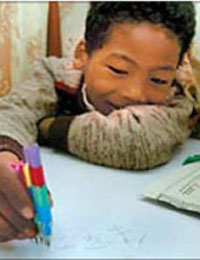| Home / Education / Education-Photo | Tools: Save | Print | E-mail | Most Read |
| Abandoned child basks in maternal love |
| Adjust font size: |
She has been doing everything for him for seven years that a mother would. But she is not his mother, rather his "grandmother", and she is not sure if he will grow up to enjoy the same rights a normal Chinese citizen does. Though he is healthy and attends classes now, will he have the same right to healthcare and education in future? She doesn't know.
Sympathy mixed with curiosity made her walk up to it. She found a baby boy wrapped in a blanket, pinned to which was a note: "The child was born on August 1, 2000." On closer inspection, she realized something was wrong with the child's complexion. Doctors later suggested the child could be of mixed (possibly African) parentage. Zhu Junlong (China Daily) Zhu, who is now more than 60 years old, has named him Zhu Junlong, but he still does not have an official identity. Zhu Junlong attends a local school only because it agreed to waive his tuition fees. But education didn't come easy. Other schools had earlier rejected his application because Zhu Shuibao couldn't furnish the names and other details of his parents. She, however, is not the only one who takes care of the boy. Her biological son and his wife, too, are equally fond of him. "School teachers also give the boy extra care. But my son and I still worry whether we can give him a good education," says Zhu Shuibao. "He has no nationality, and our family is not qualified to adopt him officially. Thus he cannot have an identity." The government agencies she has approached for help have told her that there's nothing they can do to let her adopt the child officially. The reason: her old age. And her son and daughter-in-law are reluctant to adopt him because that would mean foregoing the right to have their own child. They, however, say they will look after him should anything happen to Zhu Shuibao. The alternative is to hand Zhu Junlong over to the state welfare system. But then he would be sent to an orphanage, and Zhu Shuibao doesn't want that to happen. "I didn't even see him properly when I lifted him from the grass and brought him home because I just wanted to save him," she says. Considering the delicate relationship of the woman with the boy, the civil affairs bureau hasn't pursued putting him under state care. And nothing could be better news for Zhu Junlong, who considers his "grandma" the most important person in his life. His love for her is immense. He says: "When I'm naughty at school, my teachers scold me, and I never want them to tell my granny. That's why I want to be a good student." (China Daily November 14, 2007) |
| Tools: Save | Print | E-mail | Most Read |
 |
| Related Stories |
|

